I've been sitting here at the kitchen table, thinking, and I just realized that I haven't been fishing in a long time — more than a month — and that winter is here.
I live in the Rockies, not too far from the Canadian border, and winter is never very far from our consciousness; not even during those spectacular summer months when the sun shows its face for nearly sixteen hours a day. Most summer mornings you can walk outside and feel a hint of winter in the air; an echo of frost, a glimmer of snow up on the highest mountain tops, the sleepy embrace that seems to drop down from the pre-dawn sky and wrap itself around your heart. The first time you notice that frigid touch, it scares you to death. With time, it becomes a drug and you can't imagine living without it.
I don't have to imagine it now, though. It's here. The snow sits outside my window with the inexhaustible patience of a boreal forest and it seems obvious that we need to pay just a bit more attention to what's going on around us. Every other animal does. Every deer, every coyote, every robin, every bear, every chipmunk — every single animal lives within the immutable rhythm of nature.
For some reason, though, we humans think that we're impervious, that the snow and the cold and the dark can't touch us through the thick down coat of civilization. I guess we all have our delusions. Maybe if you live in Dallas or Atlanta you can even afford them. Up here, in the shadow of glaciers, you have to be careful. Up here your delusions can kill you.
I have a tendency, especially during the summer months, to think of winter as a static thing; a great, frozen, unmoving period of sleep and rest and dreams. Winter isn't really like that, though. Few things in nature are unmoving and unchanging. The human mind draws comfort from the idea that things stay the same, that the way things were yesterday is the way they're going to be tomorrow. Unfortunately, most of the time we're really just grasping at the wind, pretending that life is predictable and orderly while we ignore the shifting reality around us. Life is change and while it slows down a bit during the winter, it doesn't ever stop.
On days when the cold bites, I take solace in this simple fact. It might not be until tomorrow, or next week, or next month, but winter's grip will loosen for a day or two, temperatures will rise into the thirties and forties, and the earth will shift and come awake under her cloak of snow. And when it happens, I'll head to the river, find a place where the water flows slow and dark and deep, and begin to wade and cast. For trout.
Fly fishing is a summer game. Its rhythms are summer rhythms, quick and light and instinctive. It wasn't meant to be played in the cold and the snow. Unfortunately, my need sometimes grows beyond my sensibilities, and on days when winter pauses, offering a glimmer of spring, I can't always help myself.
More Like This
I know the trout are there, in the same river where they swim during the summer; maybe in a deeper spot with a slower current, but still within reach. Like everything else around them, they respond to winter by slowing down and riding it out, the need to swim and feed and reproduce subjugated by the cold. Still, they're alive, and life is an opportunist. At least that's what I tell myself, that's what I'm counting on, when I stand sausage-like in my waders and fleece and wool, hoping for a strike, a trout, for something magical to transport me back to the quick, happy days of summer.
The trout of winter are a different breed of fish, a distant relative of the familiar species we so admire during the warmer months. Their colors seem muted but metallic, the underwater equivalent of sullen winter skies. This could be an adaptation, a measure of camouflage against winter predators like mink and otter that prey on sluggish, cold-blooded fish. Then again, maybe the change is only in my perception, in the way the low angle of the sun and the distant quality of the winter light react with a trout's silvery side.
In the winter, a trout's characteristics change, too; sometimes in manners that would seem impossible to predict. Everyone knows that trout slow down, eat less and expend less energy during the winter months. But then why do brown trout, the most nocturnal, secretive, deep-diving member of the family, suddenly eschew their normal habits and become a high-flying, acrobatic fish when hooked during the winter?
In the summer, maybe one in five browns will jump when they feel the bite of my hook. When snow covers the banks, though, fully three quarters will leap like they've been shot full of tarpon juice, like they've never jumped before and they're trying to make up for lost time. Yet the rainbows, those kangaroo-cloned rockets of summer, decide to fight deep and dirty when the temperature drops. I see these things over and over, but I can't explain them and I don't understand them. Sitting here thinking, though, one thing becomes clear. We know so little, so very little. About fish, about life, about ourselves.
Fishing, at least for me, is like dirt, or cement, or epoxy. It fills the holes in my life. I fish when I'm happy, and when I'm upset; when I'm bored and when I'm busy. In the winter, I fish when I'm cold. It doesn't really matter as long as I'm standing in the river, fly rod in hand, the rhythm of the stream laid out for me to read if I'm able.
Winter rhythms are the hardest to discern because they're the most subtle. During the summer, everything is so obvious. Mayflies and caddis hatch in the cool of the morning and evening, clouds and rain and shadows offer protection for nervous fish, bright sunlight slows everything down.
In the winter, however, you're never really sure. Do you want the sun high and strong to warm the water, or do the fish prefer the obscurity of gray, sullen skies? Will the trout want a hearty meal of stonefly or a diminutive taste of midge? How deep is too deep? Your doubts grow and grow, and the hardest thing is not that you don't know all the answers, but that you can't ever be positive you've asked the right questions.
Once in a while, a trout will take your fly and you'll have the satisfaction of making the right choice, a confirmation of your skill and heart and keen eye. Usually, though, you stew in the juices of self-doubt while your hands and feet and mind go slowly numb from the cold. Winter fishing is a little like that nebulous moment before you ask the new girl to dance. You could be in for the time of your life, but you better be prepared to accept — even to embrace — rejection.
Fly fishing is a solitary sport, best practiced alone. Winter can be the exception to this rule, however. It's not a good idea to be alone in a river where one slip can leave you a certain candidate for hypothermia. In the winter, a fishing partner can be a life saver.
I am a fisherman, though, and I fish whether or not I can find someone to come along. Even in the winter. Existence is full of risks, and I tell myself that knowledge and caution can keep me safe in frigid water, ice and snow. So far, I've been right — at least mostly. If they ever find me, cold and sodden, wedged under some ice-choked log jam, feel free to say, "I told you so."
Despite the danger, there is a purity to being the only person on the stream in the winter. Snow and cold protect you from contamination when you're on the water. The people who despoil — the litterers, the slobs, the polluters who care neither for themselves or this beautiful treasure of a world — are kept at bay by the harshness of the surroundings. No cigarette butts, no styrofoam worm containers, no beer cans. Just snow and water and sky. You are alive, alive in every important, meaningful way. You have to be careful, though. It can break your heart.
People are at risk, at risk in a way that trout never are, of losing their connection to the world around us. This is especially true in the winter.
We walk into a room and if it's too dark we turn on a light, if it's too cold we turn up the thermostat. Suddenly our needs are met; we're warmed, coddled, illuminated by civilization. The danger is that we can lose the ability to understand, to intuit, to observe anything beyond the most base and obvious things around us. Standing in a stream with ice on the banks, ice in my guides, ice all around, I feel as if I've suddenly been freed from a box, a box that's been shut for so long that I've forgotten how to breath.
We wrap ourselves up in so many things, in texts and e-mails and jobs and deadlines and obligations and the people around us, that it's almost impossible to break free, to feel the weak afternoon sunshine of December or understand the mysterious natural rhythms of a stream. I envy the trout. They’re never confused about who they are, or their ultimate purpose on this planet.
The last time I fished, back in October, was on the Henry's Fork. My brother-in-law Pat and I wandered around a stretch where the trout still rose freely regardless of the cool temps and the gleaming patches of snow on the bank. There was a breeze, too — cold and pure, out of the West — and in spite of the fact that the rainbows were gorging themselves on a blanket hatch of BWOs and midges, you had to want to be there. It was cold. Our fingers were numb, and our noses too, and our feet felt like frigid strangers. There are times, even with our warming climate, when winter arrives early in the high country and we get a glimpse of what the upcoming months have in store.
And now it’s here. Now we are locked in winter’s icy embrace, free to give in, or resist — or both — as the spirit moves us. I’m drawn back to remembrances of winters past, to the days when I post-holed in through knee-deep drifts and found a truth that far too many of us will never realize.
Snow. Cold. Ice. It matters not. The magic never really sleeps.


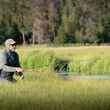
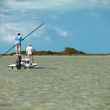
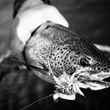
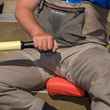
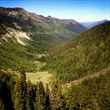
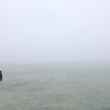
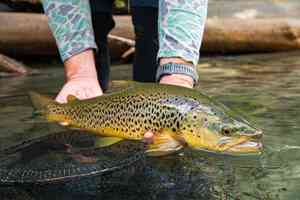


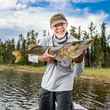

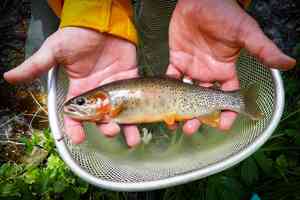



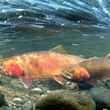


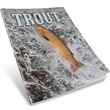
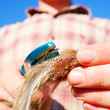
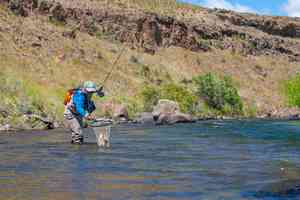


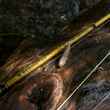
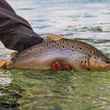


Comments
Sam Leake replied on Permalink
How do you find a stream that's not frozen mid-winter where you live? The elk are walking across our Rio Grande in Colorado.
Midge Simpson replied on Permalink
You haven't fished in the Winter until you've fallen in to the East Walker River , up to your neck when it's -5 F .
I try to keep a towel , and a change of dry clothes in my back pack or car, if it's close. Hypothermia is a Deadly Risk, but missing the solitude of Winter fishing? No way, it's my favorite time of year!
Glenn Dotter replied on Permalink
Great story. I pinched a nerve in June and had 3 vertebrae fused in September and was told no hunting or fishing. Hopefully on December 23rd when I see the doc he will say I'm good to go.
In my 60 years of flyfishing, the last 6 months have been agony. I live on the Arkansas river in Colorado and watched so many folks fishing my favorite runs and pools. I have tied flies and filled 2 boxes for my 17 year old twin grandsons. I learned how to make furled leaders. I've watched more flyfishing videos than you can imagine.
So the writer drove it all home. I fish in the winter and can't imagine another 6 months without wetting a line. As soon as the doc says ok, the first day above freezing, I'm hitting the river!
Bryan Henry replied on Permalink
Great story - has some fantastic parallels to life in general. Dark, cold days will always come in season & in life. Being paralyzed by it all is a choice. Learning to live with, enjoy & even celebrate those cold, dark days, especially knowing lighter, warmer days are coming, is a gift. See you on the river!
Pages